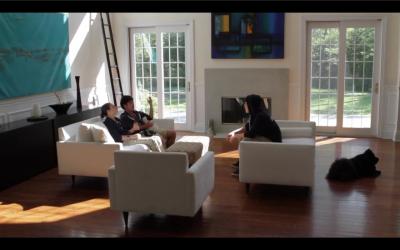Town to Reconsider 2009 Decision That Okayed Ross School Dorm Houses

Two East Hampton town officials on Monday told the Springs Citizens Advisory Committee that the town has begun looking for ways to curtail the possible use of two eight-bedroom houses under construction in Springs as dormitories for Ross School boarding students.
Meanwhile, Kristen Hyland, a Ross School representative, issued a brief statement on Tuesday saying the school “will not be occupying the two houses currently under construction at Manor Lane South or Cedar Ridge Drive in the Springs.”
Town Councilman Fred Overton, said on Monday that the town board was looking to overturn a 2009 decision that set the precedent for other student housing to be permitted in single-family residences in other parts of the town. That decision, in a letter signed by a former acting chief building inspector, Tom Preiato, said students living with “house parents” employed by the Ross School constituted the functional equivalent of a family. Therefore, the decision said, the school’s boarding practices were not in violation of a town law that says no more than four unrelated people may live in a house together.
“The town board is taking this seriously and we’re going to do everything we can to make sure it doesn’t happen again, and to do whatever we can to stop what’s going on,” Mr. Overton said.
Councilwoman Sylvia Overby said the board is also approaching the issue by attempting to redefine “basement” in the town code. The current definition is based on fire codes, which can be interpreted to allow bedrooms if there are proper exits in place, but Ms. Overby said the town board is trying instead define “basement” based on zoning regulations, prohibiting basement bedrooms regardless of whether proper exits are in place. The change could impact the two Springs houses, or similar ones — the plans call for two bedrooms in each basement.
“The town board is very disappointed in the determination” from 2009, Ms. Overby said.
Neither Ms. Overby nor Mr. Overton could be reached yesterday for a response to the Ross School’s statement.
Not all of the conversation on Monday was focused on student housing. Some residents suggested there is a bigger problem — illegal or generally overcrowded housing in Springs — that needs to be considered. Ann Barton, a resident of Cedar Ridge Drive, questioned what could happen to the two houses if student boarding was ultimately prohibited. She suggested multi-family housing could evolve where the two single-family structures are being built.
“It could be 10 times worse,” Ms. Barton said during Monday’s meeting.
Others were concerned about the capacity of the two houses’ septic systems, given their proximity to other houses that rely on well water, and whether the town’s code enforcement division could actually enforce any of the housing regulations. They believe the division is already overwhelmed by complaints.
The Ross School administration pre viously would not comment on whether the two identical eight-bedroom houses were planned as student housing. On Tuesday, beyond saying the school would not occupy the two houses, Ms. Hyland declined to say whether the administration is relying on the town’s 2009 definition of “family” to validate its system of housing students in the community. She also declined to say how many such houses the school operates, or whether the school is considering building dormitories on its campus.
David Buda, a Springs resident who has closely studied the plans for the two houses, said during Monday’s meeting he believes the 2009 decision was not meant to be universally applied. “Each one has to stand on its own facts,” he said.
Mr. Buda also said “there are remedies” to prevent the buildings from being occupied as dormitories, and ways to prevent it from happening again.
“I think we’re all of a like mind. I have to applaud the council for telling us that they’re concerned and looking into what they can do,” Mr. Buda said. “There are things that can be done. It’s very important that the town board considers acting because it’s the town officials that issued the decision.”
Yesterday, Mr. Buda said in an email that the school’s statement “is clear as mud.”
“The school owes the community a fulsome and detailed explanation of its boarding student housing program, past, present, and future,” he said.
Additionally, Mr. Buda said, the two limited liability companies that own the houses under construction in Springs “owe the town and all residents of the Springs a comprehensive narrative of how they will ensure the structures will be used by ‘a single family’ as defined by our zoning code.”
Otherwise, residents who oppose the use of the two houses as dormitories said they might have been forced to band together and hire lawyers.
“It now seems incumbent on the residents themselves to take on this challenge — put money together and go to the zoning board of appeals,” David Milne, who lives near one of the houses, said during Monday’s meeting. “Once the building is occupied, it’s going to be harder than heck to get the residents discharged.”
In recent weeks, some residents received anonymous letters alleging the houses were to be dormitories, and another neighbor previously described a conversation with the builder that confirmed their use as such.
The houses, which both sit on about half an acre and measure more than 3,000 square feet not including their basements, are in compliance with building codes for single-family housing. That is what the builder, Dunn Development, applied for, and what it says on the building permits issued by the town.
At Monday’s meeting, attended by more than 50, residents implored Ms. Overby and Mr. Overton to ask the board to take action before certificates of occupancy are issued for the two houses. The citizens advisory committee ultimately approved a resolution to send a letter to the town board saying the group is against the use of the buildings as dormitories in neighborhoods otherwise consisting of single-family houses.
